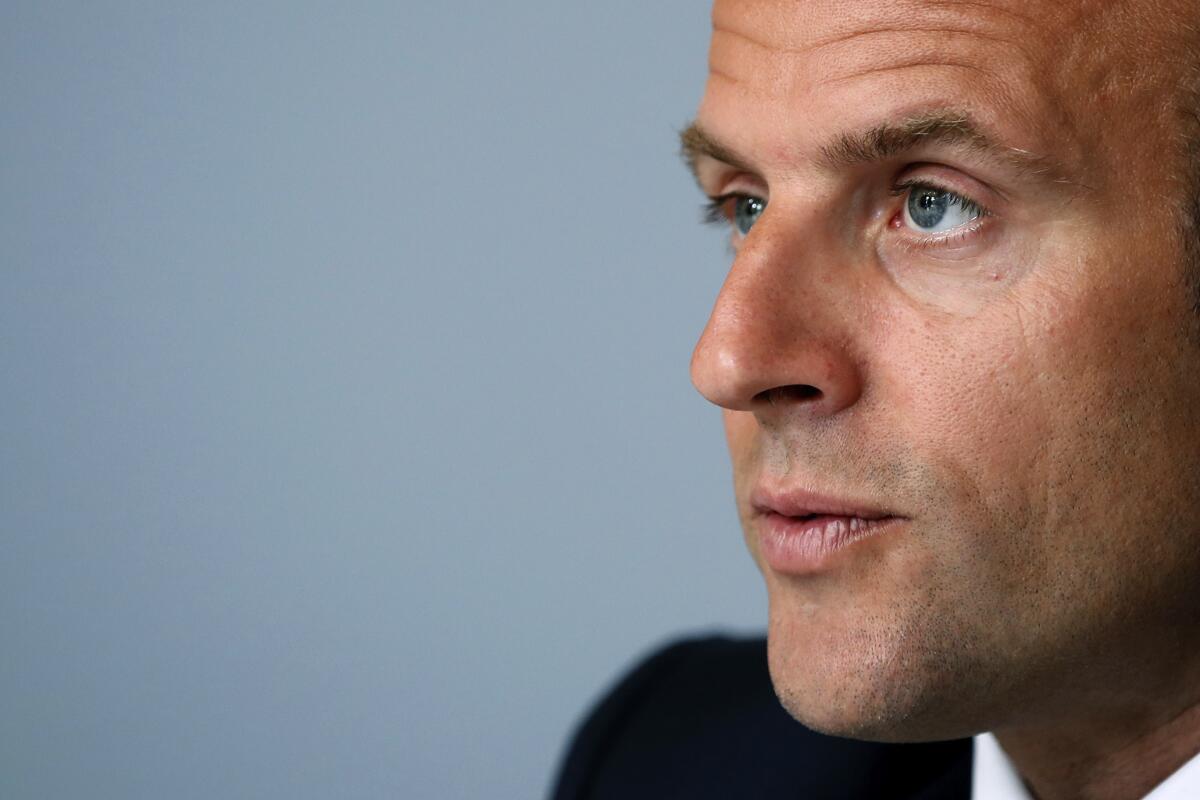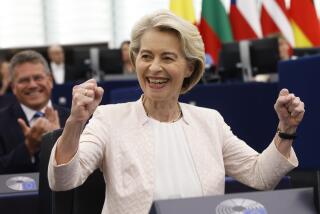Emmanuel Macron unveils his EU agenda ahead of French presidential race

- Share via
PARIS — French President Macron vowed to work to make Europe “more powerful” in the world as France is about to take up the rotating presidency of the European Union, a tenure that overlaps with the country’s presidential election and could put him in a tricky position if he campaigns for a second term.
Macron is expected to run in April’s two-round election, and France’s turn in the European Council’s rotating six-month presidency starts Jan. 1.
“Many would like to rely only on one nation. Nations are our strength, our pride, but European unity is their indispensable complement,” the proudly pro-EU president said.
“We want to get ... a powerful Europe in the world, fully sovereign, free to make its choices and master of its own destiny,” he said during a news conference in Paris.
Macron said France’s EU presidency would work to promote “a European model of growth” that would allow the 27-nation bloc to generate wealth and jobs while at the same time preserving high social and climate-related standards.
He announced a series of summits for the first half of next year to address EU defense policies and the bloc’s relationship with Africa and the Western Balkans.
Europe faces major challenges, he said, from climate change to migration issues involving “manipulation from some states” and “attempts at destabilization, tensions including in our closer neighborhood.” The European Union in recent months has accused Belarus of encouraging asylum seekers to cross from the country into neighboring EU members Poland, Lithuania and Latvia.
Macron said he would have talks with other EU leaders to make the bloc more “capable of controlling its borders.”
Macron, who was elected in 2017, has yet to formally declare whether he will seek a second term.
He noted that the schedule for France’s presidency of the EU is notably the consequence of Brexit and insisted he will fully be committed to the European task at least until the French election.
“Maybe France’s politics will change. For sure, France will remain France,” Macron said.
“I say it again: The term [in office] I was given by the French, I will serve it until the last quarter of hour,” he said.
France’s presidency of the EU could provide a platform for Macron’s campaign but also complicate it if the race is focused primarily on domestic issues such as the French economy, security and immigration.
Macron would be able to use the presidency to influence EU-wide decisions, yet the bloc’s complex and consensual decision-making process might play against him and produce few concrete actions before April’s election.
Macron promotes a vision for the EU’s “strategic autonomy” that would allow the bloc to better weather competition from China and put it on a more equal footing with the United States.
Notably, he is pushing for “a stronger and more capable European defense” that contributes to trans-Atlantic and global security and is complementary to NATO.
France’s motto for the EU presidency is “Recovery, power, belonging” — the last word meant to convey the idea of enhancing Europeans’ sense of shared belonging to the bloc.
Opinion polls suggest Macron is the front-runner in the race. Conservative and far-right candidates are polling more strongly than contenders on the left and appear in a better position to reach the runoff.
Last week, France’s main conservative party, the Republicans, chose the head of the Paris region, Valérie Pécresse, to be its candidate in the presidential race.
Known as a pro-European, Pécresse in recent months hardened her positions on immigration and security. “Macron has only one obsession: to please [people]. Me, it’s to do things,” she said, vowing to “break” with the president’s centrist policies.
Two far-right contenders, Marine Le Pen, the head of the National Rally who faced Macron in the 2017 runoff, and former TV pundit Eric Zemmour, are campaigning on anti-Islam, anti-migrant themes.
In a clear response to the far-right, almost adopting the tone of a presidential candidate, Macron concluded the news conference by saying: “When the bad winds are blowing, it’s legitimate that democratic choices are being made.”
French institutions must not make any concession “to racism nor antisemitism” he said, praising “discussions and controversies” and denouncing “hatred.”
On the left, Paris Mayor Anne Hidalgo is the candidate for the Socialist party, and the Greens chose European lawmaker Yannick Jadot, a former Greenpeace activist.
The far-left leader of the Rebel France party, Jean-Luc Mélenchon, who is seeking the presidency for the third time, called on Macron to “come into the arena to debate.”
Macron “is not above democracy,” he said.
More to Read
Sign up for Essential California
The most important California stories and recommendations in your inbox every morning.
You may occasionally receive promotional content from the Los Angeles Times.










